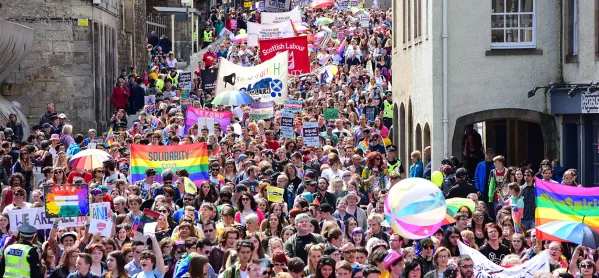What is it like being a lesbian, gay, bisexual or transgender teacher in Scotland? A new report from the LGBTQ+ Teachers Network (Scotland) highlighting the experiences of LGBTQ+ staff makes it clear that the answer to that question very much depends on the school a teacher works in.
It concludes that there are “pockets of excellent work happening across Scotland but more needs to be done for equity of staff and students across the country”.
It also notes that while Scotland was the first country in the world to embed LGBTQ+ inclusive education into the curriculum, “we seem to be far from the beacon of hope we once thought we were”.
Some of the 108 LGBTQ+ teachers who took part in the research talked about having “a very positive experience” and being in “really supportive” schools.
However, others said they had been confronted with “backwards” attitudes that made them feel it was not safe for them to be “out” in school.
One teacher said that “some local authorities are stuck in the Stone Age”; another said that they were asked to keep their “sexuality secret if moving into a [headteacher] post”.
LGBTQ+ teachers suffering prejudice
One “proud queer primary teacher“ said that “the primary context is the most homophobic/biphobic/transphobic (HBT) of all educational establishments due to narratives of childhood innocence and LGBTQ+ lives as ‘sexual’.”
That teacher called for the government and councils “to take action on HBT behaviours amongst staff”. Other teachers made pleas for senior leaders to live the values they espouse not just in public but also “behind closed doors”.
“Leading with your values has to permeate everything or it means nothing,” said one teacher.
The need for more and better training for school staff comes up on a number of occasions in the report, as does the importance of “calling out hatred” and “challenging homophobic behaviour and language”. One respondent called for “total zero tolerance of any kind of queerphobia”.
The research also gives a sense that society - and therefore schools - has become less accepting of LGBTQ+ people. One teacher said: “It feels very much like we’re going backwards, and it’s scary.”
The report says current “LGBTQ+ resentment” needs to be addressed and calls on “councils and leaders” to support staff during this period.
It also calls for LGBTQ+ inclusive education “to continue to be embedded” across all sectors; for more support for staff “to challenge homophobia/transphobia”; for more support for school leaders from “central teams and other agencies”; and for “a more robust approach to equality training and inclusive practice”.
The report says that when LGBTQ+ teachers are visible in schools it can have a hugely positive impact on pupils - from making them feel “seen and safe” to showing them “a happy LGBTQ+ life is possible”.
It also says that a classroom without representation fails to “accurately represent the world as it actually is” and can make “kids who are ‘different’ or ‘other’…feel like outsiders”.
The report adds: “The idea that teachers can be life-changing influences is nothing new. But the idea that (out) lesbian, gay, bisexual and transgender (LGBTQ+) teachers can be life-saving is.”
Just over half of those surveyed said they were “out to staff at school”, just under a third were out to some staff; and 13 per cent were not out to staff.
Most participants (58.3 per cent) were not “out to students at school”.




